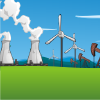TPM2016:Issues: Difference between revisions
No edit summary |
m (IT moved page Issues to TPM2016:Issues) |
(No difference)
| |
Latest revision as of 16:30, 22 January 2024
Issues represent the concerns of the global, national, local, and house community. These pressing matters have to be tackled one way or another, with the general public having different opinions on how they should be handled, depending on their individual views, party affiliation, and other factors. Candidates have all different views and their success or failure depends on how effective they are at making them known to the general public.
Stance calculation
In order to understand how voter and candidate stance is calculated, it's important to understand how the values are calculated. Each issue has two basic values:
- Importance determines how vital the issue is to a given party.
- Position determines whether the party opposes, favors, or is indifferent to the issue.
The two values are then multiplied to arrive at a basic value that is then modified by individual state values, giving the stance value:
| Stance Value | Below -80 | -80 to -40 | -40 to -20 | 0 | 20 to 40 | 40 to 80 | Above 80 |
|---|---|---|---|---|---|---|---|
| Stance |
A number of states have pre-set issue stances, according to unique cultural and historical circumstances. For instance, Gun Rights are a very divisive issue in Texas and all parties attach very high importance to the issue.
List of issues
- There are 54 issues the candidates can take a stance on and play to their benefit.
| Name | Icon | Description |  Democrats Democrats
|
 Republicans Republicans
|
||||
|---|---|---|---|---|---|---|---|---|
| Importance | Position | Importance | Position | Importance | Position | |||
| #BlackLivesMatter |  |
Some highly visible incidents involving the deaths of black men in police custody, have led to a movement complaining about the mistreatment black Americans suffer at the hands of the police. Called #BlackLivesMatter, its supporters demand justice for black people and reform in the way we train and manage police. Opponents feel that existing laws adequately protect black lives and worry that the movement masks acts of violent civil disobedience. | 4 | 6 | 4 | -4 | 4 | 4 |
| A Strong Military |  |
The United States has the most powerful military in the world, giving it a unique advantage in protecting national interests and determining global policy. Supporters feel that the costs of keeping such a massive military are worth it for such unique benefits. Opponents feel that these significant resources can be better spent elsewhere. | 4 | 2 | 4 | 4 | 4 | 2 |
| Abortion Rights |  |
Abortions have been a divisive issue in the United States for decades. Supporters of abortion rights feel that the government should not interfere with what a woman does to her own body. Opponents feel that the unborn fetus also has rights that are being violated during an abortion, and advocate for increased limits, if not outright bans, to be placed on abortions and abortion providers. | 4 | 4 | 4 | -4 | 4 | 2 |
| Addressing Climate Change |  |
Scientists warn that the Earth's temperature is rising as a result of man-made greenhouse gases, and predict this will lead to a variety of unwelcome impacts to the planet's climate. Ending this would require the reduction of activities which produce greenhouse gases. Opponents of such actions doubts the validity of the current science, and worry that the economic and social impacts of the required changes will be too great. | 6 | 4 | 4 | -4 | 4 | 1 |
| Alternative Energy |  |
Fossil fuels have a number of negatives attached to them. First, they pollute the air and in many cases must be imported from hostile regimes.
Alternative energy advocates desire federal programs to subsidize new energy sources to help them compete in the market. Opponents argue that it is not the place of the federal government to play favorites in the market and that no alternative energy is remotely ready to take the place of fossil fuels. |
2 | 7 | 2 | 2 | 2 | 4 |
| Bathroom Bill |  |
Recently, many states have passed so-called "Bathroom Bills" that require people to use bathrooms based on their biological birth gender. Supporters say that the laws are necessary to discourage predators. Others feel the laws needlessly discriminate against members of the transgender community who wish to use the bathroom that matches their gender identity. | 4 | -4 | 4 | 4 | 4 | -4 |
| Big Government |  |
Some things can be efficiently handled by a central government while others are best handled by private enterprise. No-one has ever agreed on which is which. Supporters of a larger government generally approve of regulations, government spending, and higher taxes. Opponents support lower regulations, less spending, and lower taxes. | 2 | 2 | 2 | -4 | 2 | 2 |
| Coal Mining |  |
Coal remains one of the cheapest energy sources within the United States, and new technologies promise to reduce its environmental impact. Supporters of coal mining want this cheap source of energy to continue to be exploited. Opponents doubt the effectiveness of these new technologies to mitigate coal's substantial environmental impacts and would prefer government resources and subsidies be spent on other, cleaner sources of energy. | 1 | -4 | 1 | 4 | 1 | 1 |
| Common Core |  |
The Common Core is a group of national educational standards that set out what students should know at each level of a K-12 education. They are an attempt to resolve differences between the capabilities and skills of high school graduates in different parts of the country, and better prepare them for college and employment. Opponents of Common Core worry they override state and local school districts' abilities to do what's best for their own students. | 2 | -4 | 2 | -4 | 2 | -4 |
| Confederate Flag Display |  |
The flag used by the Confederate army during the American Civil War is still flown in many places in the Southern United States. Although locals often view the flag as a symbol of regional pride, opponents consider the flag a symbol of racism and wish for it to be removed from public places. | 1 | -8 | 1 | 1 | 1 | -1 |
| Curbing Russian Might |  |
Since the collapse of the Soviet Union, Russia's military power has weakened significantly. In recent years however, Russia has begun flexing its strength again, most notably by interfering with a civil war in the Ukraine and sending its military into Syria. Some worry Russia's actions will lead to another Cold War, and desire that the United States take aggressive steps to prevent this. Others feel that diplomacy will work better. | 2 | -4 | 2 | 4 | 2 | -1 |
| Deficit Reduction |  |
The United States has run a significant deficit at various points during its history, and has built up a substantial amount of debt. Supporters of a balanced budget believe it is time to reduce our budgetary deficit, and reduce our government's total debt load. Opponents feel that the economic stimulating effects of increased spending are still valuable in our current unsettled economy. | 2 | 2 | 2 | 4 | 2 | 4 |
| Drone Warfare |  |
Unmanned aircraft have been used with increasing frequency in the past decade, and have been implicated in a number of incidents where civilians have been killed. Supporters of Drone Warfare feel that the benefits of these systems outweigh the costs, and that collateral damage from drone warfare is lower than the various alternatives. Opponents feel that drones are overused, and wish for limits to be placed on their deployment. | 1 | -1 | 1 | -4 | 1 | 1 |
| Drought Assistance |  |
Many parts of the country are suffering through serious droughts, most notably California. Although little can be done to make it rain, the government can invest in infrastructure to better capture new sources of water. Additionally, new regulations can mandate increased water efficiency in the residential, commercial, and agricultural sectors. | 1 | 4 | 1 | -1 | 1 | 1 |
| Ending Human Trafficking |  |
The increase in refugees and migrants fleeing the Middle East and North Africa has led to a rise in human trafficking groups offering to assist these migrants cross the Mediterranean. Unregulated and poorly equipped, these groups have been implicated in the deaths of several groups of migrants. Whether and how to police these groups has proven to be an election issue. | 2 | 4 | 2 | 4 | 2 | 4 |
| Farm Subsidies |  |
The government has long subsidized the agricultural sector, allowing food grown in the United States to remain competitive with food grown overseas. Supporters of farm subsidies wish for these subsides to continue to support American farmers. Opponents feel this is an inefficient use of government resources, and feel American farmers should have to compete fairly on the market. | 1 | 4 | 1 | 1 | 1 | 1 |
| Fighting ISIS |  |
The Islamic State of Iraq and Syria is a terrorist organization operating in Syria and Iraq. Involved in the civil war in Syria, ISIS is known for its brutal terrorist attacks, including the destruction of monuments and the beheading of hostages. Fighting ISIS is a complicated matter, and could involve risking U.S. troops in the Middle East, or supporting parties in the Middle East whose goals we might not share. | 4 | 2 | 8 | 8 | 5 | 5 |
| Fixing Flint Water Crisis |  |
Failures at multiple levels of government have resulted in the drinking water in Flint, Michigan becoming contaminated with lead. Some people feel that this disaster is so big that it demands a Federal response, as well as a broader discussion on investment in our infrastructure. Others see this as a local problem that should be handled by the appropriate state and local agencies. | 5 | 6 | 3 | -4 | 2 | 2 |
| Fixing Infrastructure |  |
Much of the United States' infrastructure is reaching the end of its life, and the existing system of patches and repairs can only keep it going for so much longer. Extensive new infrastructure spending may soon be required, but the cost of this will be substantial. | 2 | 4 | 2 | -4 | 2 | 2 |
| Fixing Obesity Crisis |  |
The continent hasn't started sinking under the weight of Americans yet, but maybe one day soon. Some people want the government to regulate the food and restaurant industry, enforcing labeling requirements, and restricting access to high sugar, high calorie foods. Opponents worry about the effects such heavy handed regulations might have on the free market. | 1 | 2 | 1 | -2 | 1 | 1 |
| Gun Rights |  |
Supporters of Gun Rights wish for their Second Amendment rights to own a firearm to be protected, and for regulations that restrict access to firearms to be limited or ended. Opponents feel that unfettered access to firearms is a serious public safety issue, and point to the number of high profile mass shootings that have occurred in recent years as a good reason for increased gun regulations. | 1 | -8 | 4 | 4 | 4 | -1 |
| High Gas Prices |  |
Expensive gas is un-American. Worse than that it's European. You will likely have no influence on this issue if you manage to get yourself elected, but it makes a good carrot to dangle in front of some of the more clueless voters. | 2 | -7 | 2 | -7 | 2 | -5 |
| Higher Minimum Wage |  |
Many workers in the United States cannot find jobs that pay above the minimum wage, which is almost impossible to support a family on. Supporters of a higher minimum wage want businesses to pay more to these workers, to increase their standard of life. Opponents worry that this would lead to job losses, and feel that wages are best set by the market itself. | 4 | 6 | 4 | -4 | 4 | 4 |
| Hillary's Emails |  |
In 2015 it was revealed that Hillary Clinton had been using a private email account while serving as Secretary of State. When ordered to turn these emails over, it was revealed that several thousands emails have gone missing, in violation of various governmental recordkeeping requirements. How Mrs. Clinton responds to this and other allegations against her credibility and integrity has become an important campaign issue. | 1 | 4 | 2 | -4 | 1 | -2 |
| Iranian Nuclear Deal |  |
Iran has been beligerant and diplomatically isolated for some time. Notably, its leaders have threatened to eliminate Israel on several occasions, and the country has begun its own nuclear weapons program. Western leaders have installed economic sanctions to convince Iran to stop these programs, though to date these sanctions have been ineffective. However, in the Summer of 2015 a deal was reached where these sanctions would be lifted in exchange for a halt to nuclear weapons development. Supporters of this deal feel that they will stop weapons development, and provide an important first step to reducing tensions in the region. Opponents do not trust Iran to obey the conditions of the deal, and don't want to economically reward them. | 2 | 4 | 4 | -4 | 2 | 2 |
| Keystone XL Pipeline |  |
The Keystone XL is a proposed pipeline which would transport oil from Western Canada to refineries in the United States. Although the Obama Administration rejected the pipeline in November of 2015, proponents hope that a new administration may revive the project. Supporters of this pipeline believe the environmental risks are overstated and can be controlled. Opponents disagree, and wish for passage of the pipeline to be continued to be blocked. | 2 | -4 | 2 | 4 | 2 | 0 |
| Law Enforcement |  |
Since 9/11, police forces across the United States have received powerful hardware once restricted to use by the military. Some feel that the police require these tools to deal with terrorist threats and highly equipped criminals. Others fear the effect this militarization has had on police relations with the public they're supposed to protect. | 2 | -2 | 2 | 4 | 2 | 2 |
| Legalization of Marijuana |  |
!Supporters of legalizing marijuana feel that the social and health impacts of the drug are minimal, that the current law treats marijuana users too harshly, and that if legal, revenue from its production could be taxed. Opponents feel the health and social impacts of marijuana use are too dangerous to ignore and oppose any attempts to legalize the drug. | 4 | 4 | 4 | -4 | 4 | 2 |
| More Money for Education |  |
The education system provides students with the training and education they need to lead productive lives, and provides the economy with trained, useful workers. Supporters want more money invested into the system. Opponents doubt the effectiveness of an inefficient public education system, and believe the private sector can provide a better alternative. | 2 | 4 | 2 | -4 | 2 | 2 |
| NSA Surveillance |  |
Following the September 11th Attacks, the National Security Agency began to conduct surveillance on communications within the United States to detect terrorist activity. Large amounts of personal data on normal, law-abiding citizens has been captured during these efforts, and the government's use and retention of this data has become a potential election issue. | 2 | -4 | 1 | 4 | 1 | 1 |
| Outsourcing of Jobs |  |
The United States has entered into a number of trade agreements with countries around the world, one effect of which has been that it is now cheaper to manufacture items abroad than it is to manufacture them here. This outsourcing of labor has removed a significant number of jobs from the United States' economy, to the detriment of the American middle class. Some people want trade restrictions reintroduced, or other government action taken to keep jobs in the country. Opponents worry about the effects such regulation will have on the economy. | 4 | -4 | 4 | 2 | 4 | -2 |
| Protecting Net Neutrality |  |
The current Internet infrastructure does not pay attention to the content of the data it carries, allowing the potential for important, time critical data (like video) to be delayed in favor of less time-sensitive data (like email.) A new infrastructure would make possible this "packet prioritization" and potentially lead to performance improvements for all users. But some fear that Internet service providers would preferentially carry the data of large businesses, reducing Internet quality for regular users. Supporters of Net Neutrality want all data to be treated equally. Opponents feel the benefits of packet prioritization outweigh any potential risks. | 1 | 4 | 1 | -4 | 1 | 1 |
| Reducing Unemployment |  |
The credit crunch of 2008-2009 and resulting recession led to significant job losses which still have not been fully replaced. Although economic output has increased relatively steadily since 2009, the number of jobs has recovered far more slowly. Possible steps the government could take to alleviate the situation include targeted tax breaks or increased deficit spending. | 4 | 6 | 4 | 4 | 4 | 4 |
| Reducing Wealth Gap |  |
The increasing gap in wealth between the richest and poorest Americans has become an election issue. Some want the government to adjust its economic and trade policies to begin addressing this gap, while others worry that any policies that do that will cause damage to the economy and provide benefits to people who haven't earned them. | 6 | 7 | 4 | -5 | 5 | 5 |
| Religious Freedom |  |
The Constitution protects the right of Americans to practice their religion as they see fit. But when someone's religious beliefs and practices conflict with another person's rights, supporters of Religious Freedom want their rights defended first. | 2 | -2 | 2 | 4 | 2 | 2 |
| Repealing ObamaCare |  |
The passage of the Affordable Care Act, colloquially known as Obamacare, made relatively low cost health insurance available to many American citizens. The law also mandates that citizens buy this insurance, promising a variety of penalties for non-compliance. Supporters of Obamacare value the increased access to healthcare the law provides. Opponents feel the previous system provided acceptable results, and dislike the requirement that all citizens must buy insurance, regardless of their needs or preferences. | 4 | -2 | 4 | 4 | 4 | 1 |
| Resettlement of Refugees |  |
Unrest in Syria, Afghanistan, and other areas in the Middle East has led to wave of refugees fleeing the area, overwhelming countries in Eastern and Central Europe. Other Western nations, including the United States, can help alleviate this crisis by accepting refugees into their own countries, though this will involve costs and security risks. | 4 | 4 | 7 | -8 | 4 | 4 |
| Saving The Bees |  |
Bees do more than provide delicious honey, although they do that very well. They also are an irreplaceable part of the plant pollination process, upon which significant portions of our food supply rests. The growing decline in bee populations and increasing spate of colony collapses has become a key issue for some voters. | 1 | 1 | 1 | 1 | 1 | 1 |
| Securing the Borders |  |
The borders of the United States have long been lightly secured, allowing people to enter with minimal obstruction. Some voters want our borders to be better secured, believing these uncodcumented visitors pose an economic burden to the country, and increase the threat of terrorism. Opponents view these immigrants sympathetically, believe they provide a net-benefit to the country, and wish for legal immigration be made more widely available. | 4 | -2 | 7 | 7 | 4 | 4 |
| Social Security |  |
Shifting demographics are beginning to impact the long term health of the Social Security system, and will eventually prevent the government from making all of its obliged payments. Solutions include increasing payroll deductions, reducing benefits, means testing, or some combination of the above. Alternative solutions, including the privatization of the whole system, may also be possible, but present even greater logistical challenges. | 4 | 6 | 4 | 4 | 4 | 4 |
| State Unions |  |
Some conservative governors have promised to deal harshly with government unions, demanding wage, benefit, and other concessions from them. Some support these actions, disliking the generous benefits that taxpayers pay to unionized employees. Others disapprove of their government attacking contracts which were fairly negotiated. | 2 | 4 | 2 | -4 | 2 | 1 |
| Student Loan Reform |  |
The cost of obtaining a university degree has increased dramatically over the past few decades, and an increasing number of students are graduating with unmanageably large amounts of debt. Supporters of Student Loan Reform want our current regulations to be rewritten to allow debt relief for more students. Opponents feel this isn't fair, and don't want taxpayers providing someone an education for free. | 4 | 4 | 4 | -4 | 4 | 2 |
| Support for Israel |  |
Israel has long been a close ally of the United States, which has provided it with significant military and economic support over the years. Some Americans approve of this and note that Israel shares many of our values and remains a useful ally in a region where we don't have many. Others are upset with Israel's military and security actions against the Palestinians, as well as its inability to take genuine steps towards making peace, and wish that United States support be withheld. | 4 | 4 | 4 | 6 | 4 | 4 |
| Supporting Gay Marriage |  |
In 2015 the Supreme Court ruled that the same-sex marriage bans that some states had implemented were unconstitutional, effectively making same-sex marriage legal across the United States. Supporters of Gay Marriage applaud this, and want state governments to remove all remaining barriers preventing same-sex marriages. Opponents continue to disapprove of these marriages, and advocate for civil disobedience to protest this decision. | 6 | 4 | 4 | -4 | 4 | 2 |
| Supporting GMO Trade |  |
Genetically Modified Organisms refer to agricultural products which have been genetically modified to improve agricultural yield, quality, or disease resistance. Supporters of GMOs appreciate the increased yield these products have, and the resulting decrease in price. Opponents worry that the health effects of these products are not fully understood, and wish for GMOs to be properly labeled, or removed from store shelves entirely. | 1 | -4 | 1 | 1 | 1 | 0 |
| Supporting Green Jobs |  |
Green Jobs refer to work in fields that preserve or restore environmental quality, often in the alternative energy sector. Supporters wish for government resources, including subsidies and tax breaks, be spent to boost this sector of the economy. Opponents don't want the government to interfere with the natural actions of the market. | 2 | 4 | 2 | 4 | 2 | 4 |
| Supreme Court Nomination |  |
The unexpected death of a Supreme Court justice in an election year has threatened to create a Constitutional crisis. Some feel that the President should immediately nominate a replacement. However, others feel that waiting until after the election would de-politicize the process and ensure voters have a say in the direction of the court. | 1 | 7 | 1 | -7 | 1 | 0 |
| Tax Cuts |  |
Taxes take money away from businesses and individuals to be used by the government. Supporters of tax cuts want to give more money to businesses for them to grow, or to individuals to save or spend as they see fit. Opponents of tax cuts prefer the benefits of either reducing the budget deficit or keeping government spending at current levels. | 4 | -2 | 4 | 4 | 4 | 2 |
| The Environment |  |
A number of environmental issues can flare up during any election, ranging from air, water, and ground pollution, to the introduction of new energy efficiency standards, to the protection (or over-protection) of endangered species. | 4 | 4 | 4 | -2 | 4 | 2 |
| The War on Terror |  |
Recent attacks in Paris have dramatically illustrated the threat terrorists are still capable of dealing. Combating such attacks could require military action, or significant intrusions into the privacy of American citizens. Some support these measures, feeling that the benefit of preventing such terror attacks are worth the cost. Others disagree. | 4 | -4 | 6 | 4 | 4 | 2 |
| Traditional Values |  |
Many in the United States feel that their way of life is under attack. They want the government to take action on a number of issues, including limiting publicly funded birth control, access to abortion, and gay marriage. Opponents support those issues, and feel that limiting them would unfairly penalize women, gay people, or other groups. | 2 | -4 | 2 | 4 | 2 | 4 |
| Video Game Violence |  |
Video games, like this one, make people, like you, mindlessly kill each other all the time. Or perhaps they don't. The research is sparse and incomplete, and public debate rests heavily on unsubstantiated claims. Some people want access to video games to be restricted, especially amongst young children. Opponents WILL FLIP OUT AND KILL YOU RIGHT NOW FOR SAYING THAT!!!111!11!, and feel that such heavy handed regulation is inappropriate. | 1 | -1 | 1 | -1 | 1 | -1 |
| Wall Street Regulation |  |
The variety and complexity of financial securities has increased dramatically in the past couple decades, which has introduced unknown risks into the world's economic system. Notably, these complicated securities were one of the factors that led to the housing bubble of the mid 2000's and the resulting credit crunch of 2008-2009. Supporters of increased Wall Street Regulation want these new securities to be more tightly regulated by the government to reduce systemic risk. Opponents feel that the market is capable of regulating these risks themselves. | 2 | 4 | 2 | -4 | 2 | 2 |
| War On Drugs |  |
Supporters of the War on Drugs worry about the health and social impacts that drugs have and feel that penalties for drug offenses are appropriate or should be stricter. Opponents observe that the War on Drugs have had a limited impact on drug use, is racially biased, and should be replaced with less harsh penalties, or even steps towards decriminalization and legalization. | 1 | -4 | 1 | 4 | 1 | -1 |






